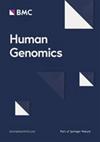Prioritizing susceptibility genes for the prognosis of male-pattern baldness with transcriptome-wide association study
IF 4.3
3区 医学
Q2 GENETICS & HEREDITY
引用次数: 0
Abstract
Male-pattern baldness (MPB) is the most common cause of hair loss in men. It can be categorized into three types: type 2 (T2), type 3 (T3), and type 4 (T4), with type 1 (T1) being considered normal. Although various MPB-associated genetic variants have been suggested, a comprehensive study for linking these variants to gene expression regulation has not been performed to the best of our knowledge. In this study, we prioritized MPB-related tissue panels using tissue-specific enrichment analysis and utilized single-tissue panels from genotype-tissue expression version 8, as well as cross-tissue panels from context-specific genetics. Through a transcriptome-wide association study and colocalization analysis, we identified 52, 75, and 144 MPB associations for T2, T3, and T4, respectively. To assess the causality of MPB genes, we performed a conditional and joint analysis, which revealed 10, 11, and 54 putative causality genes for T2, T3, and T4, respectively. Finally, we conducted drug repositioning and identified potential drug candidates that are connected to MPB-associated genes. Overall, through an integrative analysis of gene expression and genotype data, we have identified robust MPB susceptibility genes that may help uncover the underlying molecular mechanisms and the novel drug candidates that may alleviate MPB.通过全转录组关联研究确定男性型秃发预后的易感基因优先顺序
男性型脱发(MPB)是男性脱发最常见的原因。它可分为三种类型:2 型(T2)、3 型(T3)和 4 型(T4),其中 1 型(T1)被认为是正常的。虽然已经提出了各种与 MPB 相关的基因变异,但就我们所知,还没有进行过将这些变异与基因表达调控联系起来的全面研究。在本研究中,我们利用组织特异性富集分析确定了 MPB 相关组织面板的优先级,并利用了基因型-组织表达版本 8 中的单个组织面板以及上下文特异性遗传学中的跨组织面板。通过全转录组关联研究和共定位分析,我们分别为 T2、T3 和 T4 确定了 52、75 和 144 个 MPB 关联。为了评估 MPB 基因的因果关系,我们进行了条件分析和联合分析,结果发现 T2、T3 和 T4 的推定因果关系基因分别为 10、11 和 54 个。最后,我们进行了药物重新定位,确定了与 MPB 相关基因有关的潜在候选药物。总之,通过对基因表达和基因型数据的综合分析,我们发现了稳健的 MPB 易感基因,这些基因可能有助于揭示潜在的分子机制和可能缓解 MPB 的新型候选药物。
本文章由计算机程序翻译,如有差异,请以英文原文为准。
求助全文
约1分钟内获得全文
求助全文
来源期刊

Human Genomics
GENETICS & HEREDITY-
CiteScore
6.00
自引率
2.20%
发文量
55
审稿时长
11 weeks
期刊介绍:
Human Genomics is a peer-reviewed, open access, online journal that focuses on the application of genomic analysis in all aspects of human health and disease, as well as genomic analysis of drug efficacy and safety, and comparative genomics.
Topics covered by the journal include, but are not limited to: pharmacogenomics, genome-wide association studies, genome-wide sequencing, exome sequencing, next-generation deep-sequencing, functional genomics, epigenomics, translational genomics, expression profiling, proteomics, bioinformatics, animal models, statistical genetics, genetic epidemiology, human population genetics and comparative genomics.
 求助内容:
求助内容: 应助结果提醒方式:
应助结果提醒方式:


